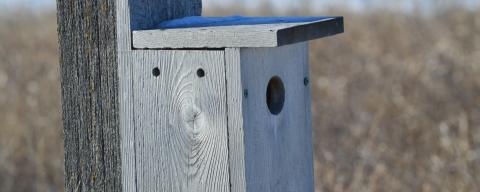How can I get birds to use birdhouses in my yard and garden?
Yards and gardens can provide great habitat for a number of the most common and cherished songbirds in New Hampshire, and installing birdhouses is a way to entice many of these species to take up residence. Although not all songbirds will use birdhouses, species that nest in cavities such as house wrens, Eastern bluebirds, black-capped chickadees, and tree swallows will often use birdhouses that have been properly constructed and placed.
Whether you’re building or purchasing new bird houses, it is important to make sure that they are well constructed. Many birds are choosy when it comes to where they nest, and your birdhouses are more likely to be used if you stick to the following guidelines.
- Birdhouses should be constructed of untreated wood and only painted on the exterior. The fumes from paint or pressure treated wood can be harmful to birds.
- Incorporate a hinged side that makes it simple to clean. Many species won’t use a birdhouse if it has a nest from a previous year inside, and rodents will often build nests in them during the winter months. Early March is a good time to clean any debris out of birdhouses, long before the songbird breeding season begins.
- Entrance holes should be 1 3/8” in diameter or smaller to keep starlings out.
- No perches on the front. The only birds that use them are nuisance and non-native starlings and house sparrows.
- At least four 1/2” drainage holes in the bottom to allow rain to escape and two 5/8” ventilation holes at the tops of each side (four total).
- Sides should enclose the floor to keep rain from entering.
- A sloped roof with a 4” overhang in the front and 2” on the side will keep most rain out.
- There should be grooves leading to the exit hole on the interior of the box (unless the wood is rough textured) to make it easier for fledglings to get out.
Once you have adequate birdhouses, you’ll want to focus on properly mounting and them. Whenever possible, avoid hanging birdhouses from trees or buildings. Instead, attach them to metal poles, which are much easier to put predator guards (baffles) around. Raccoons, squirrels, and cats will raid nest boxes if they are allowed the opportunity.
Your birdhouse placement will also impact whether they are occupied or not. Try to space birdhouses at least 25’ apart, because some species are territorial and will not allow other birds to nest too close by. Of equal importance is the height of the birdhouse. For most species, bird houses should be at least five feet above the ground, if not higher.
The habitat type near the birdhouse will determine which species might use it. For example, birdhouses that are placed near water are more likely to attract tree swallows, whereas house wrens will use those in gardens. Eastern bluebirds prefer to nest on the edge of open fields, while chickadees like wooded areas.
Make sure to get your birdhouses up as soon as possible in the spring, well before the start of the breeding season. Mid to late March is ideal. If you don’t get your birdhouses up early enough, they may still be used to raise a second brood later in the summer, or the following year.
Remember, there are many other ways to attract birds to your yard besides putting up birdhouses. Planting a wide variety of trees and shrubs, providing a source of clean water, and encouraging insect populations by avoiding the use of unnecessary pesticide applications are all essential aspects of creating a healthy habitat for our feathered friends.
Learn more about birdhouses, their placement, and the species you can attract from NestWatch.
Got questions? The Ask UNH Extension Infoline offers practical help finding answers for your home, yard, and garden questions. Call toll free at 1-877-398-4769, Monday to Friday, 9 a.m. to 2 p.m., or e-mail us at answers@unh.edu.
Related Resource(s)
Do you love learning about stuff like this?
SUBSCRIBE TO Granite State Gardening newsletter
Got questions? The UNH Extension Yard and Garden Infoline offers practical help finding answers for your yard and garden questions.
Call toll free at 1-877-398-4769, Monday to Friday, 9 a.m. to 2 p.m., or fill out webform.

